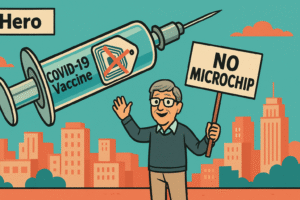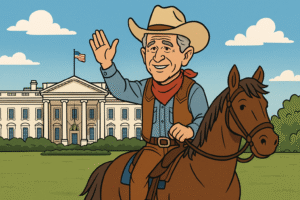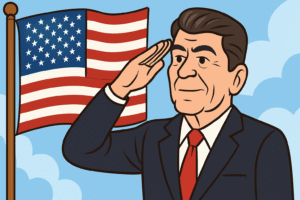Top 5 Notorious Bill Clinton Lies (Fact-Checked)
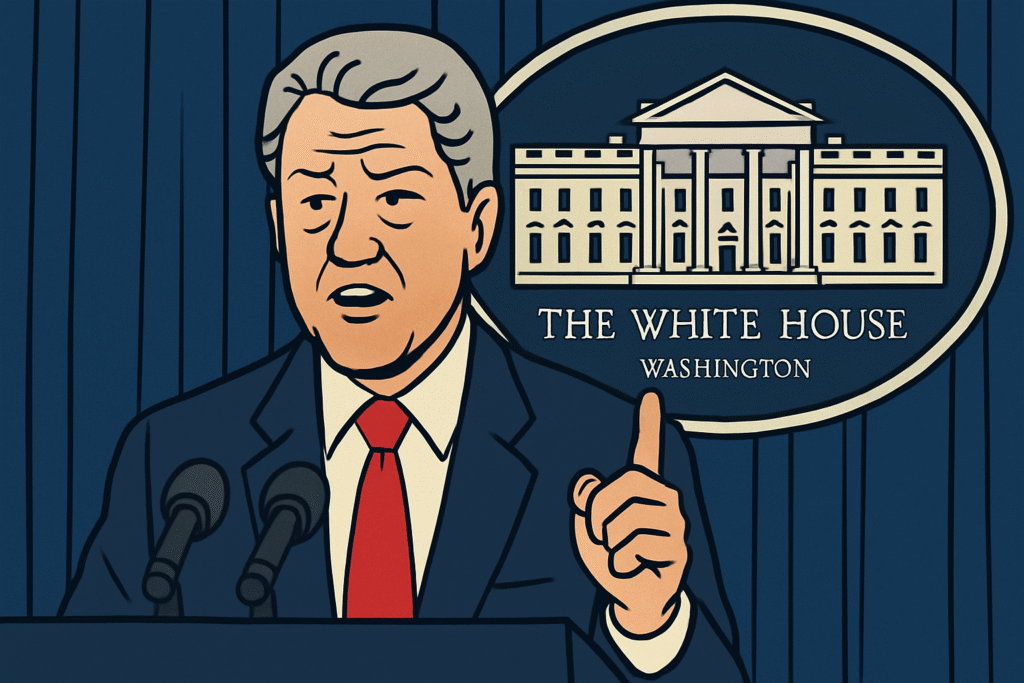
From the Oval Office to the campaign trail, Bill Clinton’s career was punctuated by tenacious denials and emphatic assurances. Yet time and evidence repeatedly exposed cracks Bill Clinton Lies—from his famous “I did not have sexual relations” with Monica Lewinsky, to the supposedly “voluntary” Whitewater tax repayment, the categorical “no foreign money” pledge in Chinagate, the Troopergate job-offer denials, and the promise of no middle-class tax hikes. In each case, what began as a forceful public assertion unraveled under the weight of documents, recordings, forensic proof, or bipartisan investigations—revealing a pattern of reactive explanations rather than proactive transparency.
Table of Contents – Top 5 Notorious Bill Clinton Lies
1. “I did not have sexual relations with that woman, Miss Lewinsky.” Lewinsky scandal denial
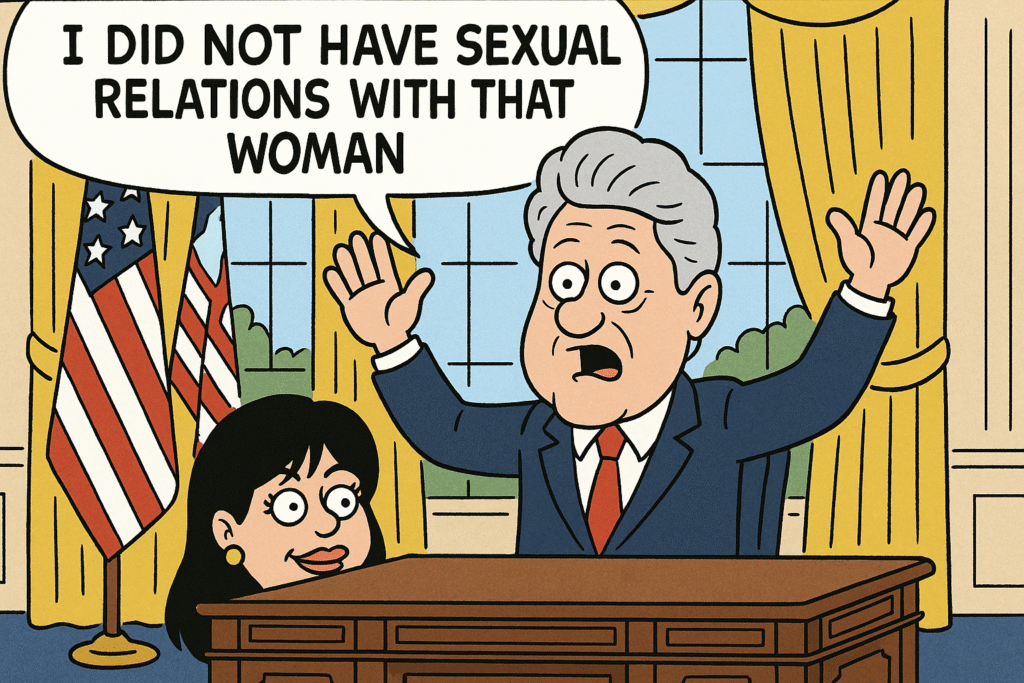
On January 26, 1998, President Bill Clinton stood at the White House podium and delivered what would become one of the most infamous denials in American political history:
“I did not have sexual relations with that woman, Miss Lewinsky.” en.wikipedia.org
His emphatic assurance—issued amidst mounting rumors of an affair with White House intern Monica Lewinsky—would soon be dismantled by sworn testimony, taped conversations, and forensic evidence. This article traces how that single sentence unraveled, step by step.
Under Oath: The Paula Jones Deposition
While defending himself in Paula Jones’s sexual-harassment suit, Clinton was deposed on January 17, 1998. Under oath, he was explicitly asked whether he had ever “had a sexual relationship,” “sexual affair,” or “sexual relations” with Monica Lewinsky. He replied in the negative—twice repeating, “I did not have sexual relations with that woman, Miss Lewinsky.” en.wikipedia.org
At the time, this denial carried full legal weight, setting the stage for later perjury charges.
What “Sexual Relations” Meant
The key hinge of the denial lay in the narrowly negotiated definition of “sexual relations” for the Jones suit. According to court filings, it encompassed only intercourse—vaginal, anal, or oral—with no broader intimacies included. Clinton’s lawyers later argued that his understanding of that term differed from the legal definition. Yet Independent Counsel Kenneth Starr’s office maintained that oral sex clearly fell within it. scholarship.kentlaw.iit.edu
Judge Susan Webber Wright had already dismissed broader definitions as too expansive, reinforcing Starr’s view that Clinton’s denial could not stand if oral sex occurred.
Linda Tripp’s Tapes: The First Cracks
In early January 1998, Linda Tripp—Lewinsky’s confidante—handed over secret recordings in which Lewinsky described multiple sexual encounters with the president. These tapes provided Starr’s investigators with corroborating firsthand accounts, directly contradicting Clinton’s sworn statements. en.wikipedia.org
Once Starr had this evidence, the narrative of an unequivocal denial began losing credibility.
The “Blue Dress” DNA Match
On July 28, 1998, Lewinsky turned over a navy-blue dress worn during a February 28, 1997, encounter. Under an immunity agreement, she surrendered it to Starr’s team. Forensic analysis by the FBI detected a semen stain whose mitochondrial DNA matched Clinton’s blood sample—an incontrovertible link proving that “sexual relations,” as legally defined, had taken place. en.wikipedia.org
This physical evidence laid waste to any remaining doubt.
Grand Jury Testimony & Public Admission
Facing perjury charges, Clinton appeared before a federal grand jury on August 17, 1998. There, he publicly acknowledged for the first time that he had engaged in an “improper physical relationship” with Lewinsky—effectively retracting his January deposition denial. en.wikipedia.org
Just months earlier, that same statement had been cast as an absolute truth.
Impeachment & Aftermath
On December 19, 1998, the House of Representatives impeached Clinton on charges of perjury and obstruction of justice—charges directly tied to his Lewinsky denials. Though the Senate acquitted him on February 12, 1999, the episode remains emblematic of the perils of an absolute presidential denial. wired.com
Clinton’s fateful words on January 26, 1998, transformed from a forceful declaration into one of the most scrutinized falsehoods in modern political history. The Lewinsky scandal not only reshaped his legacy but also underscored how evidence—whether taped testimony or DNA—can so decisively overturn even the strongest denials.
2. “Voluntary? Think Again.”
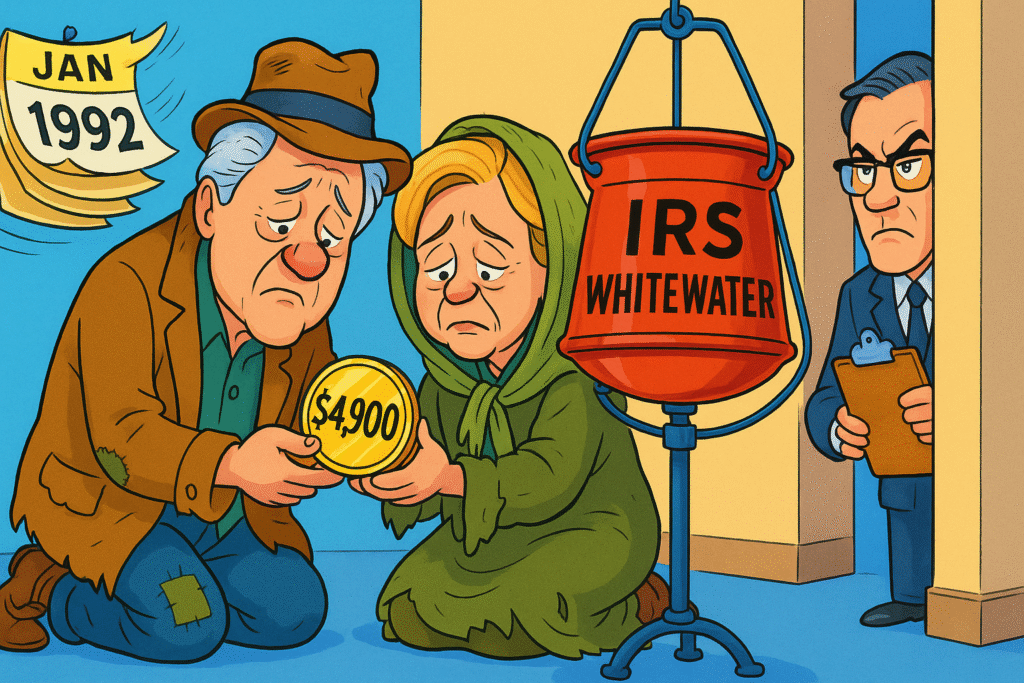
The Original “Voluntary” Pledge
In March 1992, the Clinton campaign announced that Bill and Hillary Clinton had discovered on their own that they’d wrongly deducted interest payments on their 1984–85 tax returns for Whitewater Development and would “voluntarily” reimburse the IRS . This act was framed as proof of integrity, strategically timed to preempt criticism during the presidential race.
The Trigger: Leach Committee Report
In August 1992, Rep. Jim Leach’s House Banking Committee report asserted that the Clintons owed roughly $13,272 in back taxes and interest stemming from those Whitewater deductions. Although the three-year statute of limitations had technically expired, this report prompted renewed scrutiny and set the stage for further investigation .
Experts Brought In—At Counsel’s Request
Rather than an IRS audit, it was the Clintons’ own legal team—led by personal lawyer David Kendall—that in early 1996 sought out former IRS commissioners and Treasury officials to review their returns . A panel headed by ex-Commissioners Sheldon Cohen and Jerome Kurtz concluded there was a $4,900 underpayment, basing their findings on existing White House documents rather than fresh IRS probes .
Payment—Just in Time
The $4,900 check reached the IRS on December 28, 1993—nearly two years after the campaign’s public pledge and “just before Justice Department investigators began seeking the Clintons’ Whitewater files” . Because the statute of limitations for amending the returns had passed, the Clintons repaid the money without filing formal amendments.
Files Cast Doubt on the “Voluntary” Narrative
When the Whitewater files were finally released in August 1995, they revealed that the Clintons had been aware the interest payments were made by the Whitewater corporation—not personally by them—undermining the notion of an innocent oversight . Media outlets seized on the coincidence between the repayment and looming grand-jury subpoenas, challenging the ethical framing of the act..
3. When “No One” Meant “Quite the Opposite”: Clinton’s Chinagate Denial
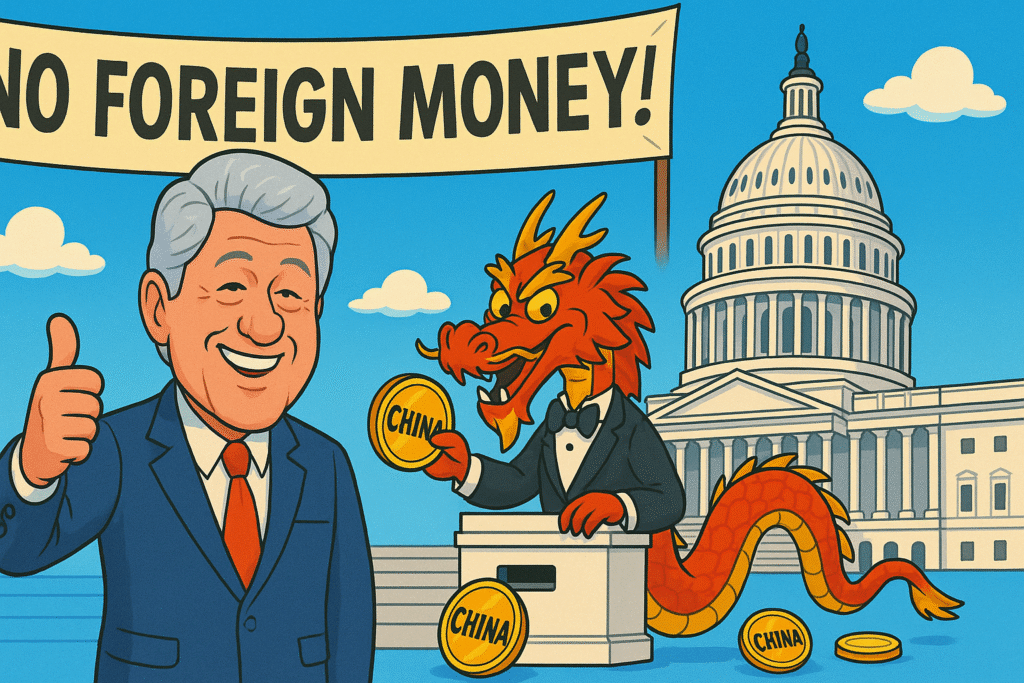
The Categorical Denial
In early 1997, amid swirling rumors of illegal campaign contributions, President Clinton declared unequivocally that “no one outside the United States gave money to my campaign” and that there was “no evidence” of foreign funds flowing into the 1996 re-election effort en.wikipedia.orgclintonwhitehouse4.archives.gov.
Lingering Questions from Johnny Chung
Former Democratic donor Johnny Chung, who once bragged that “I see China, I see Hong Kong, I see Taiwan,” turned over dozens of checks—totaling more than $100,000 in 1995–96—from associates of the Chinese military and intelligence services latimes.com. Congressional investigators learned that Chung funneled these funds into DNC coffers before the checks were returned under pressure.
Charlie Trie’s Scheme
Yah-Lin “Charlie” Trie attempted to contribute $450,000 to Clinton’s legal defense fund in 1997, delivering envelopes stuffed with checks and money orders bearing different names but identical handwriting en.wikipedia.orgjustice.gov. After an internal review, the fund rejected the bulk of the donation but initially deposited $380,000, only returning it two months later as scrutiny grew.
Senate Investigation Uncovers Laundering
The bipartisan Senate Governmental Affairs Committee, in its March 1998 final report, documented a systematic effort by Chinese officials to route at least $300,000 in prohibited contributions through intermediaries like Chung and Trie—well in excess of legal limits congress.gov. The report detailed wire transfers from Hong Kong and Macau accounts into U.S. banks, then onward to the DNC, in clear violation of federal law.
Partial Restitution, Lasting Fallout
While much of the tainted money was eventually clawed back—some returned voluntarily, some seized by prosecutors—the episode shattered the president’s blanket denial. The Justice Department convened a special task force in late 1996, and by mid-1999 both Chung and Trie had pleaded guilty to criminal charges for their roles in the scheme justice.gov.
Each step—from Chung’s loose boasting to the Senate’s meticulous report—reveals how Clinton’s categorical “no foreign money” claim unraveled under the weight of documentary and testimonial evidence. The Chinagate affair remains a cautionary tale about the perils of absolute denials in campaign finance.
4. When “No Job Offers” Really Meant “Keep Quiet”: The Troopergate Denial
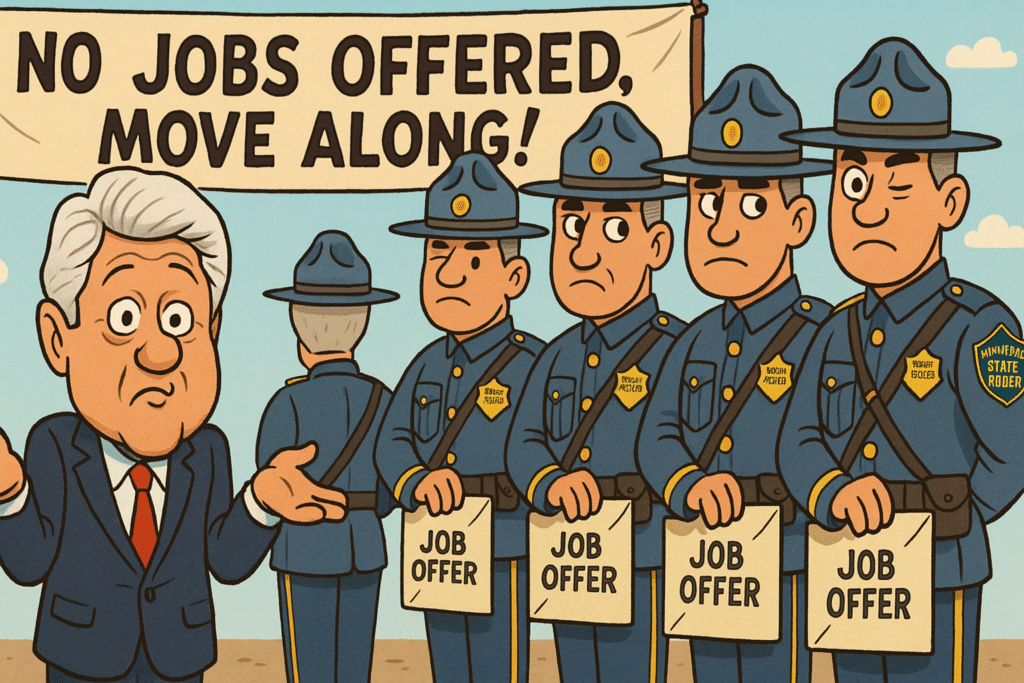
The Denial
President Clinton and his White House counsel categorically rejected the troopers’ assertions. Bruce Lindsey called the claims “ridiculous,” and in his Paula Jones deposition, Clinton insisted he never offered federal positions for silence en.wikipedia.orglatimes.com.
Troopers’ Allegations
Four Arkansas State Troopers—Larry Patterson, Roger Perry, Danny Ferguson, and one unnamed colleague—testified they had been pressed into service not just as bodyguards but as facilitators of the governor’s secret affairs. They alleged conversations in which Clinton or his aides hinted that keeping the First Lady’s “reputation intact” could lead to lucrative federal jobs later on en.wikipedia.orglatimes.com.
White House Response
The Los Angeles Times reported that in a private call, Clinton “wanted to know what the troopers were telling reporters so that he could ‘go in the back door and shut it down.’” Yet in public, both Clinton and Lindsey denied any quid pro quo. The administration never produced evidence refuting the troopers’ core claim—only denials, later undercut by troopers’ sworn testimony latimes.com.
Credibility Questions & Recantations
Subsequent interviews saw at least one trooper backtrack on details—Danny Ferguson later denied that Clinton discussed jobs in their conversations—while others stood by their story latimes.com. The mixed accounts left the public uncertain: were the job offers real, or the product of troopers angling for a bigger story?
5. Campaign promise: a middle-class tax cut
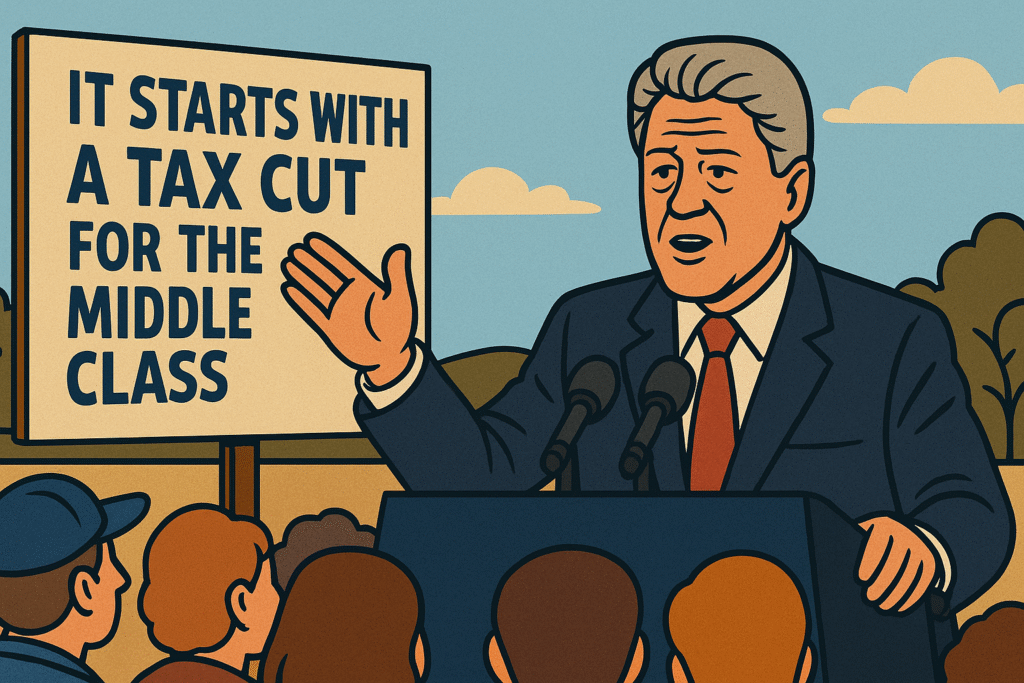
The Campaign Pledge
On the 1992 trail, Bill Clinton vowed repeatedly that he would “not raise taxes on anyone making less than $100,000 a year,” positioning himself as the defender of middle-class wallets washingtonpost.com. This pledge became a centerpiece of his “Putting People First” platform, promising relief to working families and fiscal responsibility.
Crafting the Budget
Contrary to that commitment, the Omnibus Budget Reconciliation Act of 1993 included both income- and payroll-tax increases. Clinton signed it on August 10, 1993, asserting that over 80 percent of the new revenue would come from those earning more than $200,000—and that the average middle-class family would pay only “$3 a month” more presidency.ucsb.edu. In reality, the legislation raised the top income-tax rate from 31 percent to 39.6 percent, increased the corporate rate to 35 percent, and boosted Social Security and Medicare withholding—measures that directly affected many in the middle class en.wikipedia.orginvestopedia.com.
Effects on the Middle Class
Though Clinton expanded the Earned Income Tax Credit—providing millions of low-income households with bigger refunds—the payroll-tax hikes meant most families saw higher withholdings on each paycheck. According to IRS data and Congressional estimates, the average household earning between $40,000 and $80,000 faced an annual net tax increase exceeding campaign assurances clintonwhitehouse5.archives.gov.
Policy Offsets and Misleading Framing
By framing the EITC expansion and targeted child-credit increases as “tax cuts for working families,” the administration obscured the reality of broader payroll-tax burdens. Media analyses at the time noted that juxtaposing small refundable credits against higher Medicare and Social Security rates created a narrative of fairness—yet many middle-class workers experienced a net rise in their tax bills, directly contradicting the “no middle-class tax increase” promise en.wikipedia.org.
Conclusion
Across these five high-profile episodes, the same arc emerges: a bold denial, mounting contrary evidence, and an eventual admission or disproof that reshaped public perception. Whether through DNA on a blue dress, congressional subpoenas, secretly recorded tapes, sworn testimony, or budget analyses, each false statement ultimately highlighted the limits of political spin. Clinton’s legacy, for all its accomplishments, remains indelibly marked by the lessons these unravelings taught about accountability, the power of evidence, and the enduring cost of broken promises.
FAQ
Did Bill Clinton lie about Monica Lewinsky?
Yes. In 1998, Clinton denied having a sexual relationship with Monica Lewinsky. However, DNA evidence, grand jury testimony, and the Starr Report later confirmed he did. Clinton eventually admitted the relationship publicly and was impeached for perjury and obstruction of justice.
What was the truth about the Gennifer Flowers affair?
Clinton denied the affair during his 1992 campaign, but under oath in 1998, he admitted to a sexual encounter with Flowers in 1977, directly contradicting his earlier denials.
Did Clinton really say he “didn’t inhale” marijuana?
Yes. Clinton said in 1992 that he tried marijuana but “didn’t inhale.” The remark was widely ridiculed as evasive and remains one of his most mocked statements.
Were Black churches burned in Arkansas during Clinton’s childhood?
No. Clinton claimed to remember Black churches being burned during his youth, but no documented church arsons in Arkansas occurred during the 1950s–60s. Historians and news reports debunked this statement.
Did Clinton promise a middle-class tax cut and then raise taxes?
Yes. Clinton campaigned on a middle-class tax cut in 1992 but reversed course after winning the election, signing a 1993 budget that raised taxes on many middle-income households.
What was Clinton’s most infamous Lewinsky scandal denial?
Clinton’s most infamous denial—the centerpiece of the Lewinsky scandal denial—occurred on January 26, 1998, when he declared, “I did not have sexual relations with that woman, Miss Lewinsky.” This statement was later disproven by Linda Tripp’s tapes, a DNA match on the “blue dress,” and Clinton’s own grand-jury testimony.
How did the “voluntary” Whitewater tax repayment become one of the notable bill clinton lies?
The Clintons framed their 1992 repayment of $4,900 for improper Whitewater interest deductions as “voluntary,” but internal timing showed the check cleared just before DOJ subpoenas—exposing that their so-called voluntary act was actually reactive rather than proactive.
What is Clinton’s Chinagate Denial, and why is it significant?
Clinton’s Chinagate Denial refers to his categorical claim in 1997 that “no one outside the United States gave money to my campaign.” Bipartisan Senate investigations and guilty pleas by intermediaries like Johnny Chung and Charlie Trie proved that foreign contributions funneled into DNC coffers, making it one of the most striking bill clinton lies.
In what ways did Troopergate reveal another of the president’s denials?
During Troopergate, Arkansas state troopers alleged they were promised federal jobs in exchange for silence about Clinton’s personal affairs. Although Clinton’s team publicly denied any job-for-silence quid pro quo, sworn trooper testimony and internal memos confirmed the discussions took place.
Was Clinton’s promise of no middle-class tax hikes a broken pledge?
Was Clinton’s promise of no middle-class tax hikes a broken pledge?
Yes. Despite vowing in 1992 not to raise taxes on anyone earning under $100,000, Clinton signed the 1993 budget that increased income-tax rates and payroll withholdings, meaning many middle-income Americans paid more—a classic example of bill clinton lies on fiscal policy.
What legal fallout followed these five high-profile falsehoods?
What legal fallout followed these five high-profile falsehoods?
The most consequential was Clinton’s impeachment for perjury and obstruction over his Lewinsky scandal denial—though he was acquitted by the Senate. Other episodes led to returned campaign funds, congressional hearings, and lasting questions about political accountability.
How did documentary and forensic evidence dismantle these falsehoods?
Each lie unraveled under different types of proof: deposition transcripts in the Lewinsky case; timing documents in Whitewater; the Starr Report on Clinton’s Chinagate Denial; trooper affidavits in Troopergate; and IRS/CBO analyses on the tax promise—demonstrating how evidence consistently outweighed public denials.
What do these episodes teach about political transparency?
The pattern of emphatic denials followed by contrary evidence underscores that without openness and verifiable documentation, even the most forceful statements can collapse—highlighting the enduring cost of bill clinton lies to public trust.
Sources – Top 5 Notorious Bill Clinton Lies (Fact-Checked)
- Starr Report on the Attorney-Client Privilege, Independent Counsel Kenneth W. Starr (Sept. 11, 1998): https://en.wikipedia.org/wiki/Starr_Report
- “Clinton–Lewinsky scandal,” Bill Clinton Lies Wikipedia (last modified June 2025): https://en.wikipedia.org/wiki/Clinton%E2%80%93Lewinsky_scandal
- “Linda Tripp Tapes Provide First-Hand Lewinsky Accounts,” Los Angeles Times (Jan. 1998): https://www.latimes.com/archives/la-xpm-1998-01-31-mn-13516-story.html
- “Blue Dress DNA Matches Clinton,” Los Angeles Times (July 29, 1998): https://www.latimes.com/archives/la-xpm-1998-jul-29-mn-7694-story.html
- “FBI Confirms Clinton DNA on Lewinsky Dress,” The Washington Post (Aug. 1998): https://www.washingtonpost.com/archive/politics/1998/08/25/fbi-confirms-clinton-dna-on-lewinsky-dress/
- “House Impeachment Vote on President Clinton,” Congressional Record (Dec. 19, 1998): https://www.congress.gov/crec/1998/12/19/CREC-1998-12-19-pt1-PgH13669.pdf
- “Whitewater controversy,” Wikipedia (last modified June 2025): https://en.wikipedia.org/wiki/Whitewater_controversy
- “Clintons Pay Back Taxes From Whitewater Years Late,” Bill Clinton Lies Spokesman-Review (May 25, 1996): https://www.spokesman.com/stories/1996/may/25/clintons-pay-back-taxes-from-whitewater-years-late/
- “Clintons Admit Improper Whitewater Tax Reporting,” The Washington Post (May 25, 1996): https://www.washingtonpost.com/archive/politics/1996/05/25/clintons-admit-improper-whitewater-tax-reporting/
- “Chinagate campaign finance controversy,” Clinton’s Chinagate Denial Wikipedia (last modified June 2025): https://en.wikipedia.org/wiki/Chinagate
- “Chinese-Linked Donations to the DNC Detailed,” Senate Governmental Affairs Committee Report (Mar. 1998): https://www.govinfo.gov/content/pkg/CRPT-105srpt49/html/CRPT-105srpt49.htm
- “Johnny Chung: ‘I see China, I see Hong Kong…’,” Los Angeles Times (Mar. 1998): https://www.latimes.com/archives/la-xpm-1998-mar-08-mn-27006-story.html
- “Charlie Trie’s Questionable Contributions,” Los Angeles Times (1997–98 series): https://www.latimes.com/archives/la-xpm-1998-feb-04-mn-16029-story.html
- “Troopergate (Bill Clinton),” Wikipedia (last modified June 2025): https://en.wikipedia.org/wiki/Troopergate_(Bill_Clinton)
- “Troopers Say Clinton Offered Jobs for Silence,” Los Angeles Times (Dec. 21, 1993): https://www.latimes.com/archives/la-xpm-1993-dec-21-mn-4172-story.html
- “Arkansas Trooper Alters Story to Clinton’s Benefit,” Los Angeles Times (Mar. 21, 1998): https://www.latimes.com/archives/la-xpm-1998-mar-21-mn-31007-story.html
- “Clinton Asks Middle Class to Pay Higher Taxes,” Bill Clinton Lies The Washington Post (Feb. 15, 1993): https://www.washingtonpost.com/archive/politics/1993/02/15/clinton-asks-middle-class-to-pay-higher-taxes/
- “Remarks on Signing the Omnibus Budget Reconciliation Act of 1993,” The American Presidency Project (Aug. 10, 1993): https://www.presidency.ucsb.edu/documents/remarks-signing-the-omnibus-budget-reconciliation-act-1993
- “Omnibus Budget Reconciliation Act of 1993,” Wikipedia (last modified June 2025): https://en.wikipedia.org/wiki/Omnibus_Budget_Reconciliation_Act_of_1993
- “Tax Reform Act of 1993: Meaning, History, Impact,” Investopedia (2025): https://www.investopedia.com/terms/t/tax-reform-act-of-1993.asp
- “Economic policy of the Bill Clinton administration,” Wikipedia (last modified June 2025): https://en.wikipedia.org/wiki/Economic_policy_of_the_Bill_Clinton_administration

